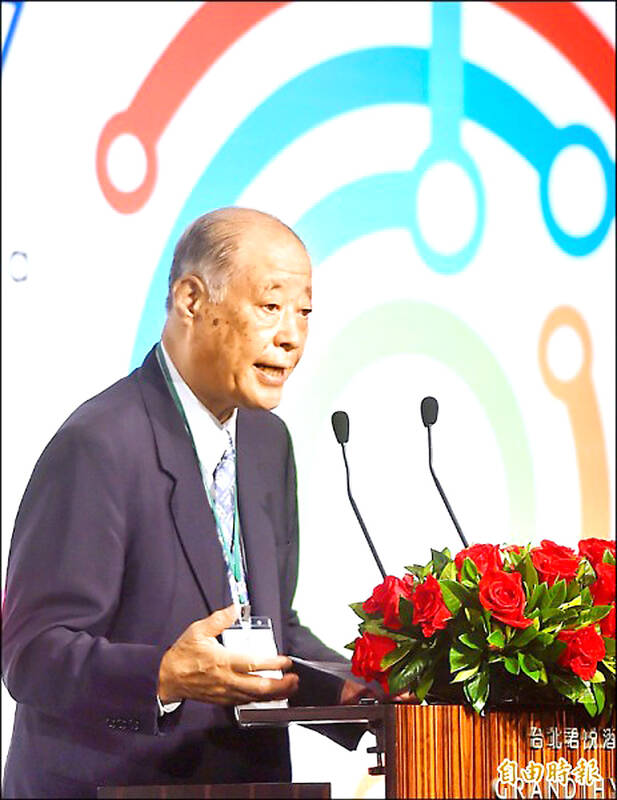China is unlikely to attempt an invasion of Taiwan, as defeat would mean the collapse of the Chinese Communist Party, a former Japanese defense official said on Sunday.
China is also facing food security problems and its military strength remains insufficient for an invasion of Taiwan, Tokuichiro Tamazawa, who formerly served as director-general of the Japan Defense Agency, said during a speech at an event held by the Japan-Taiwan Exchange Association in Taipei.
In a Facebook post, political commentator Akio Yaita quoted 85-year-old Tamazawa as saying that this week’s visit to Taiwan was aimed at “uniting Taiwanese in the face of Chinese projections of strength.”

Photo: Lu Yi-hsuan, Taipei Times
If Taiwanese show determination to defend themselves, democracies worldwide would come to their aid, Tamazawa was quoted as saying.
Tamazawa said that as China imports 5 percent of its food, and since its Belt and Road Initiative has failed to boost its food security as Beijing had hoped, 70 million Chinese face food security problems.
Those food imports are also being threatened by Russia’s invasion of Ukraine, as China previously had obtained 27 percent of its imported grains from the two nations, he said.
The problem is exacerbated by the fact that 60 percent of China’s population eats pork and 1kg of pork requires 30kg of grain to produce, he said, adding that China is also struggling to catch enough fish to meet demand, especially as Chinese fishers are banned from fishing within 200 nautical miles (370km) of Japanese waters.
“Launching a war requires an abundant food supply. If China were to start a war now, it would immediately face food shortages,” Tamazawa said. “You can’t fight a war on an empty stomach.”
He said that the US invasion of Japan in World War II could be used as a reference for how an attempted invasion of Taiwan might unfold.
“The US military had roughly 700,000 troops, 30 aircraft carriers and 300 warships when it initially attempted to take Kyushu, which had a garrison of 200,000 troops,” he said. “Despite its greater numbers, the US was unable to take Kyushu at that time.”
China would need at least 1.3 million to 1.6 million troops to invade Taiwan and it is currently not capable of transporting that number to Taiwan in the timeframe required, he said.
Beijing realizes that an invasion would fail, which is the reason it uses aggressive cognitive warfare tactics against Taiwan, Tamazawa said.

CHAOS: Iranians took to the streets playing celebratory music after reports of Khamenei’s death on Saturday, while mourners also gathered in Tehran yesterday Iranian Supreme Leader Ayatollah Ali Khamenei was killed in a major attack on Iran launched by Israel and the US, throwing the future of the Islamic republic into doubt and raising the risk of regional instability. Iranian state television and the state-run IRNA news agency announced the 86-year-old’s death early yesterday. US President Donald Trump said it gave Iranians their “greatest chance” to “take back” their country. The announcements came after a joint US and Israeli aerial bombardment that targeted Iranian military and governmental sites. Trump said the “heavy and pinpoint bombing” would continue through the week or as long

TRUST: The KMT said it respected the US’ timing and considerations, and hoped it would continue to honor its commitments to helping Taiwan bolster its defenses and deterrence US President Donald Trump is delaying a multibillion-dollar arms sale to Taiwan to ensure his visit to Beijing is successful, a New York Times report said. The weapons sales package has stalled in the US Department of State, the report said, citing US officials it did not identify. The White House has told agencies not to push forward ahead of Trump’s meeting with Chinese President Xi Jinping (習近平), it said. The two last month held a phone call to discuss trade and geopolitical flashpoints ahead of the summit. Xi raised the Taiwan issue and urged the US to handle arms sales to

State-run CPC Corp, Taiwan (CPC, 台灣中油) yesterday said that it had confirmed on Saturday night with its liquefied natural gas (LNG) and crude oil suppliers that shipments are proceeding as scheduled and that domestic supplies remain unaffected. The CPC yesterday announced the gasoline and diesel prices will rise by NT$0.2 and NT$0.4 per liter, respectively, starting Monday, citing Middle East tensions and blizzards in the eastern United States. CPC also iterated it has been reducing the proportion of crude oil imports from the Middle East and diversifying its supply sources in the past few years in response to geopolitical risks, expanding

Pro-democracy media tycoon Jimmy Lai’s (黎智英) fraud conviction and prison sentence were yesterday overturned by a Hong Kong court, in a surprise legal decision that comes soon after Lai was jailed for 20 years on a separate national security charge. Judges Jeremy Poon (潘兆初), Anthea Pang (彭寶琴) and Derek Pang (彭偉昌) said in the judgement that they allowed the appeal from Lai, and another defendant in the case, to proceed, as a lower court judge had “erred.” “The Court of Appeal gave them leave to appeal against their conviction, allowed their appeals, quashed the convictions and set aside the sentences,” the judges